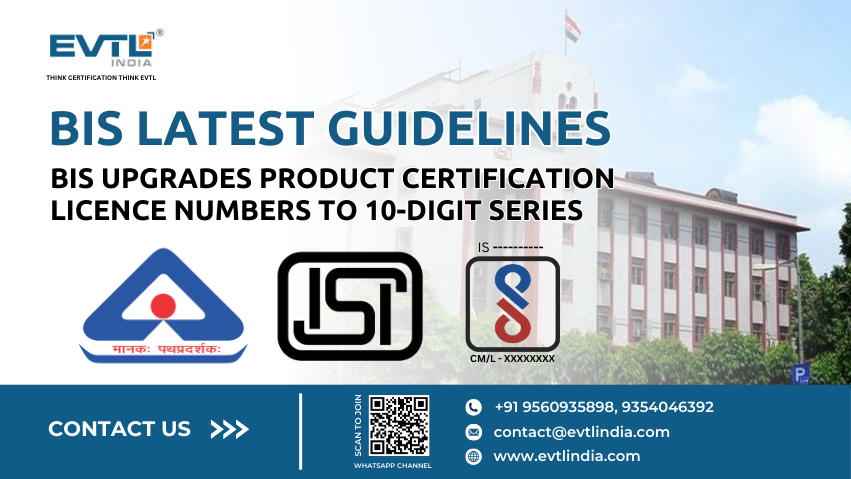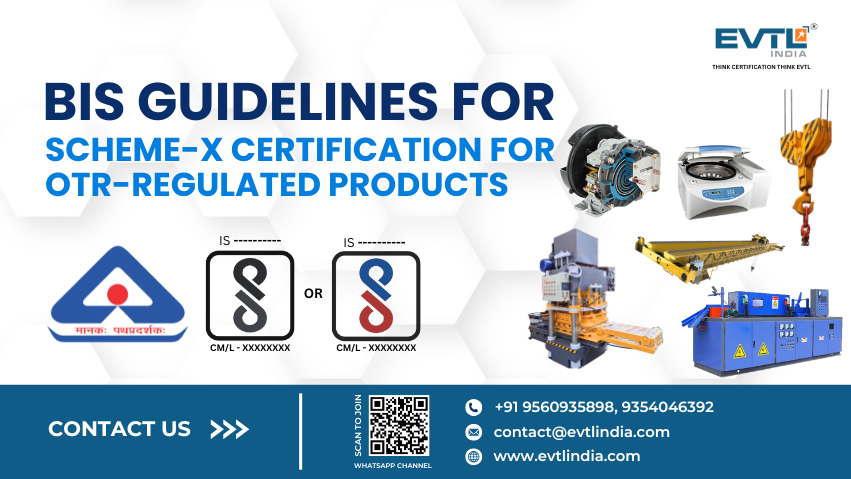Implementation Guideline for Household, Commercial and Similar Electrical Appliances IS 302 (Part 1) : 2024

The Department for Promotion of
Industry and Internal Trade has updated the Indian standard for the safety of
household and similar electrical appliances. The existing standard, IS 302-1: 2008, titled Safety of Household and Similar Electrical
Appliances: Part 1 - General Requirements (Sixth Revision), has been
revised and replaced with IS 302 (Part
1): 2024/IEC 60335-1: 2020, titled Household
and Similar Electrical Appliances – Safety: Part 1 - General Requirements
(Seventh Revision).
Both standards, IS 302 (Part 1): 2008 and IS
302 (Part 1): 2024/IEC 60335-1: 2020, will remain valid and operate
concurrently until 23rd February 2026.
Overview of
the Quality Control Order (QCO), 2024
The QCO mandates BIS certification for all electrical appliances used in households,
commercial spaces, or similar applications. This applies to appliances with
voltage not exceeding 250V for single-phase alternating current and 415V for
three-phase alternating current. Appliances already covered under other Quality
Control Orders issued by the Bureau of Indian Standards (BIS) are excluded. A
detailed list of excluded appliances is available in Annexure-I.
Revised Safety
Standard: IS 302 (Part 1)
The safety standard IS 302 (Part 1)
has been updated from the 2008 version to IS
302 (Part 1): 2024/IEC 60335-1: 2020. Both versions will run concurrently
until February 23, 2026, to
facilitate a smooth transition for manufacturers. After
February 23, 2026 the standard 302 Part 1:2008 will be suspended and only 302
Part 1:2024 will be operative.
What
Manufacturers Need to Know
Manufacturers can apply for BIS
certification under either the old or revised standard during the transition
period. Depending on whether their product falls under the IS 302 (Part 2)
series, specific compliance requirements will apply. Products not covered under
Part 2 standards will rely solely on the applicable IS 302 (Part 1) standard
for certification.
Existing license holders with voluntary BIS certifications can transition their licenses to align with IS 302 (Part 1): 2008 or opt for separate licenses. Compliance with the revised standard is mandatory by the end of the concurrent period.
Key Steps for
Compliance
Manufacturers must submit updated test
reports from BIS-recognized third-party labs for additional requirements in the
revised standards. BIS will verify the implementation during subsequent
inspections. All necessary changes should be completed before the concurrent
period ends to avoid issues.
Product
Manuals and Transition Guidelines
Updated product manuals for both the
2008 and 2024 standards are available on the BIS website. These manuals provide
guidance on the revised requirements and ensure smooth implementation of the
updated standards.
Key Revisions
in IS 302 (Part 1): 2024
The updated standard includes changes to licensing scope, inspection and testing schemes, marking requirements, and grouping guidelines. These revisions align the Indian standard with international standards, specifically IEC 60335-1: 2020. Detailed revisions can be found in Annexure-III.
Implementation
Timeline
BIS officers will oversee the
implementation of the revised standards to ensure compliance. Any challenges
must be reported within 30 days of issuing these guidelines. By the end of the
concurrent period, all licenses must align with the 2024 standard, or they will
be handled under prevailing BIS guidelines.
For New
Applications
Applications submitted before sample
testing can follow the old standard, but post-concurrent period submissions
must comply with the revised standard. Manufacturers are encouraged to
transition early to avoid disruptions.
Application Submission: Manufacturers
can submit applications for a grant of licence either according to IS 302 (Part
1): 2008 or the revised IS 302 (Part 1): 2024/IEC 60335-1: 2020, until the end
of the concurrent running period.
Compliance with IS 302 (Part 2):
- If an application is based on
IS 302 (Part 1): 2008 and the relevant product standard is available in IS
302 (Part 2), the licence will be granted after compliance with both IS
302 (Part 1) and the relevant IS 302 (Part 2) standard.
- If the relevant standard is not
available in IS 302 (Part 2), the licence will be granted based on IS 302
(Part 1): 2008.
Application based on IS 302 (Part 1): 2024:
- If the application is based on
IS 302 (Part 1): 2024 and the relevant standard exists in IS 302 (Part 2),
the licence will be granted after compliance with both IS 302 (Part 1):
2024 and the corresponding IS 302 (Part 2).
- If the relevant standard is not
available, the licence will be granted based on IS 302 (Part 1): 2024 and
relevant IEC standards.
For existing licensees:
1.Manufacturers
with a voluntary licence for electrical appliances under IS 302 (Part 2) series
or relevant product standards can choose to switch their licence to IS 302
(Part 1): 2008.
2.Alternatively,
they can apply for a separate licence under IS 302 (Part 1): 2008.
3.In both
cases, the new licence will cover the same scope as the existing licence
without the need for additional testing or inspection.
Significance
of These Updates
These updates aim to improve appliance
safety, align with international benchmarks, and enhance consumer trust in
certified products. Stakeholders are urged to act promptly to meet the new
requirements and ensure seamless compliance.
For further information, visit the BIS
website or consult the relevant annexures and product manuals.
You can contact us via email at contact@evtlindia.com or by phone at 9560935898. Feel free to get in touch with us anytime for the support you need.
BIS ISI Mark Certification | BIS-CRS Certification | EPR E-WASTE | WMI Registration | BIS Certification For Footwear | TAC & IMEI Registration | BIS FMCS Page | TEC | EPR Registration for Plastic Waste Management | EPR Registration for Battery Waste Management | EPR Registration For Used Oil | EPR Registration for Tyre Waste Management | WPC ETA License | NOC | LMPC | Legal Metrology | Trademark Registration | ISO Certification | EMI-EMC Test | Toys | GEM Registration | EPCG Scheme | LM 79 & LM 80 | ROHS Approval | CDSCO Registration | RF Testing | IP Rating Test | MSME & NSIC Registration | BIS Certificate for Conformity | BIS Scheme-X Certification | Hallmark Registration | Laboratory Recognition Scheme | ECO-MARK Certification | RDSO | CE Certification | List Of Equipments | US FDA Registration | Lab Setup & Lab Equipment |
Recent Posts

BIS Upgrades Product Certification License Numbers to 10-Digit Series

BIS Guidelines for Scheme-X Certification for OTR-Regulated Products

Mandatory Compliance for Input Materials of Steel and Steel Products for Imports

CPCB Notification on Labelling of Plastic Packaging

CPCB Guidance on filing of Application, Fees and more
Free Call Back
Why Choose EVTL INDIA
Expertise in Indian Regulatory Standards
End-to-End Support
Trusted by Top Indian & Global Brands
Fast Processing & Transparent Pricing
Strong Liaison with Indian Authorities
Company Profile

















